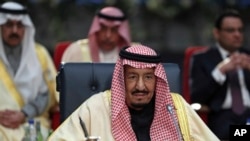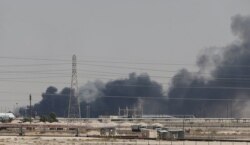Saudi King Salman said Tuesday his country is capable of defending itself against the "cowardly attacks" that knocked out half of its oil production, but called on the international community to "clearly confront" the perpetrators.
The Saudi government reiterated its accusation that Iranian weapons were used in the attack, but offered no evidence of its claim.
The statement was in line with remarks Monday from U.S. President Donald Trump signaling that Washington believes Tehran was responsible for the drone attacks, but was holding off on a definitive conclusion pending more investigation.
The Saudi Cabinet said the middle-of-the-night attacks early Saturday, cutting Riyadh's oil production by 5.7 million barrels a day, threatened international security and global energy supplies.
Trump offered mixed signals about a possible U.S. response to the attack on its ally, Saudi Arabia.
"I'm not looking to get into new conflict, but sometimes you have to," he said. "That was a very large attack, and it could be met by an attack many, many times larger."
"Certainly, it would look to most like it was Iran," he concluded.
The president added that it would be known who is responsible “for certain over the next pretty short period.”
Earlier Monday, Trump told reporters in the Oval Office during a meeting with the crown prince of Bahrain, Salman bin Hamad bin Isa Al Khalifa, that while he does not want war with Iran, “The United States is more prepared” for a conflict than any country in history.
“With all that being said, we’d certainly like to avoid it,” Trump said.
With Trump strongly signaling that Iran was behind the attacks, Iran's supreme leader, Ayatollah Ali Khamenei, on Tuesday dismissed the possibility of negotiating with Washington over its nuclear program unless the U.S. returned to the 2015 international pact that restrained Iran's nuclear weapons program in exchange for lifting economic sanctions against Iran.
In withdrawing the U.S. from the accord last year, Trump reimposed the sanctions, hobbling the Iranian economy. There had been suggestions in recent days that Trump could meet next week with Iranian President Hassan Rouhani when both are at the annual United Nations General Assembly.
"Iranian officials, at any level, will never talk to American officials," Khamenei said, adding that Trump's attempt to link Iran to the drone attacks was "part of their policy to put pressure on Iran."
With the uncertainty about responsibility for the drone attacks, U.S. House Speaker Nancy Pelosi asked the Trump administration to brief all 435 members of the House of Representatives on its intelligence findings.
The attacks spiked world crude prices Monday by about 15%, but retreated by 6% of the higher price on Tuesday.
"Geopolitical uncertainty is certainly nothing new in the Middle East," said Michael Hewson, chief market analyst at CMC Markets UK.





